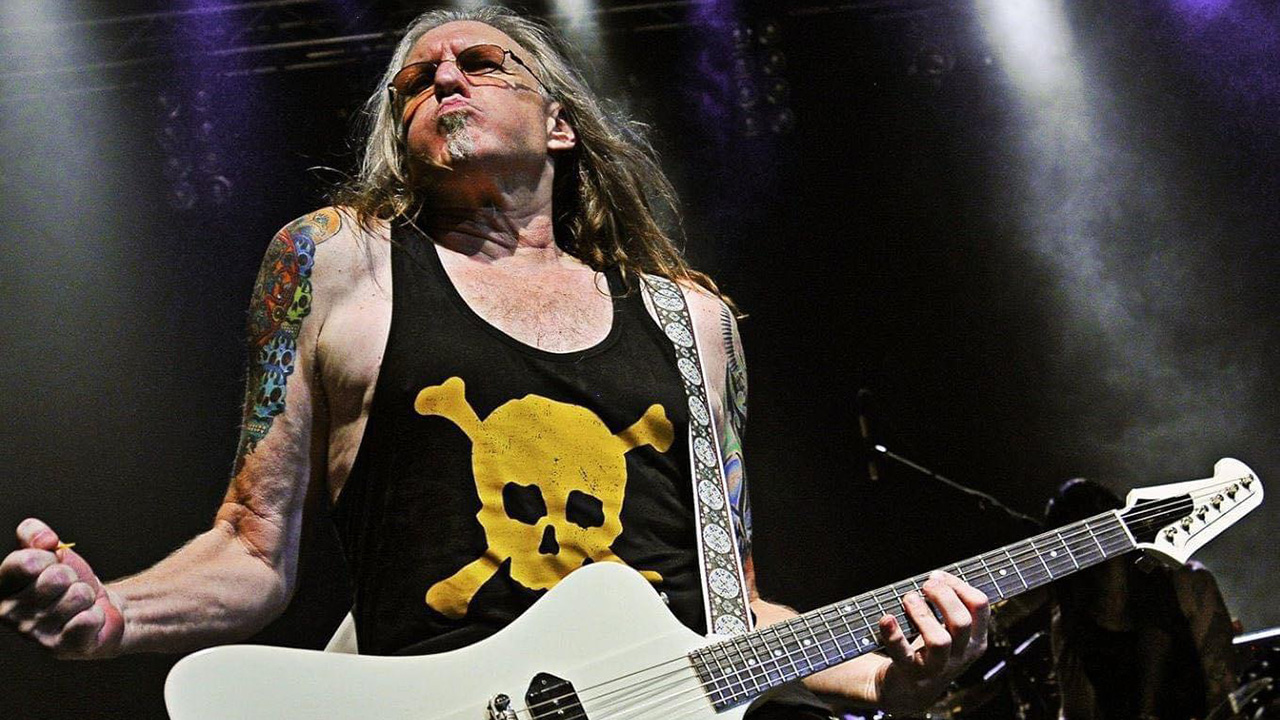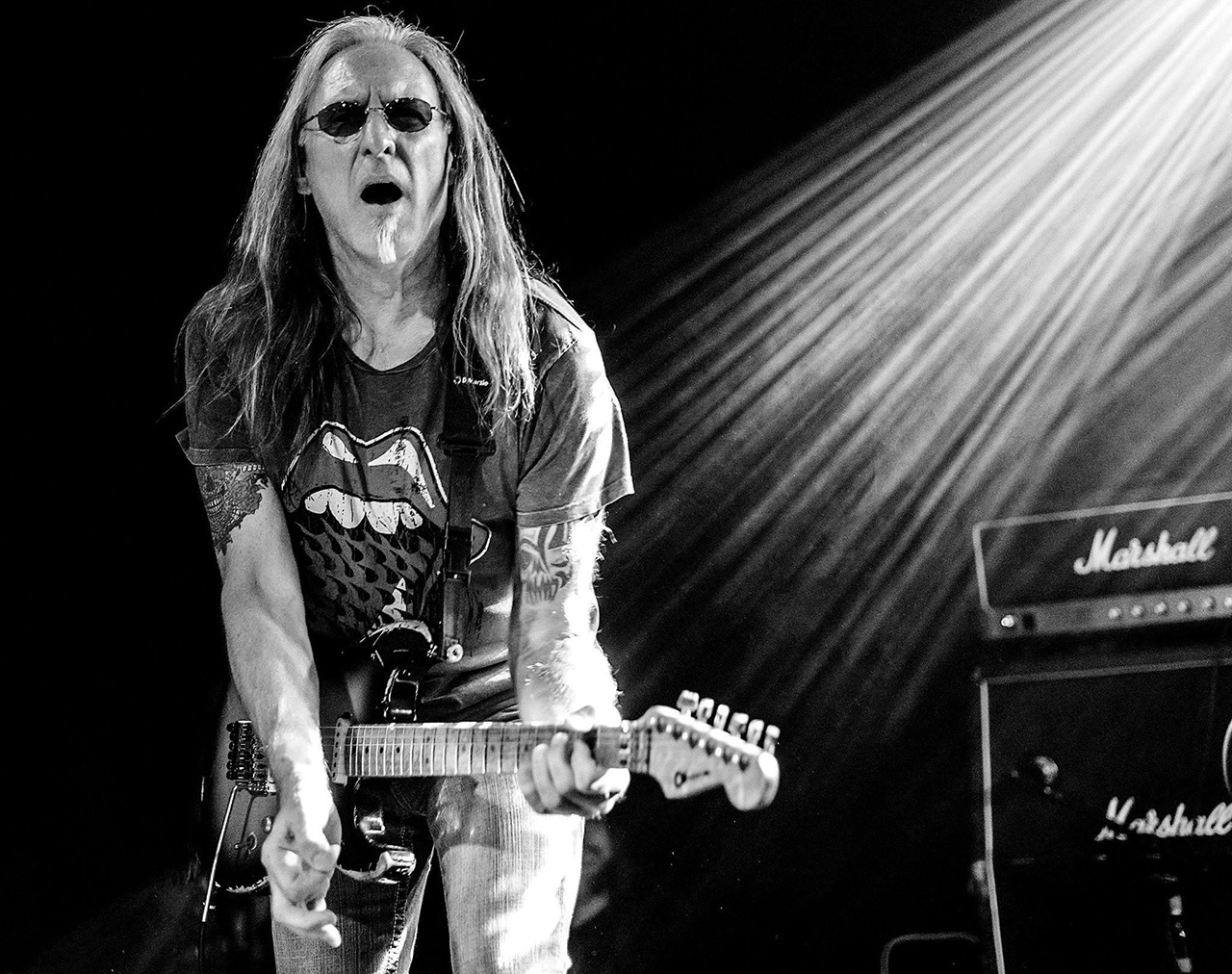
Followers of Grand Funk Railroad will be aware that Bruce Kulick – who joined in 2000, four years after being jettisoned from Kiss – vacated his post in January 2024.
“I will forever cherish my time in Grand Funk these past 23 years,” he said at the time. “It was a great opportunity for my career and performing powerful classic hits with Don Brewer and Mel Schacher was a thrill for me.”
Brewer soon announced Kulick’s replacement: former Bob Seger guitarist Mark Chatfield. “Having been friends and bandmates with Bruce and Mark for over 40 years,” Brewer said, “it’s a pleasure and a real kick to know both of these great classic guitar players as contributors to the legacy of Grand Funk Railroad.”
Columbus, Ohio native Chatfield’s early claim to fame was signing a record deal out of high school in the ‘70s with his The Godz, before latching on to Seger after Drew Abbott left the Silver Bullet Band.
Chatfield appears to be the perfect replacement, with a style in lockstep with Grand Funk’s. “I’m excited for this,” he says. “I went to the last three shows they did with Bruce, just to watch the lay of the land. I’m super familiar with all the Grand Funk stuff – I’ve played half the songs and I’ve always been a fan. The comfort level is there.”
Your band, The Godz, signed with Casablanca Records out of high school. How did that go down?
“After we got a stable lineup – me, Bob Hill [guitars], Eric Moore [bass] and Glen Cataline [drums] – in maybe late ’75, we started playing some sounds that were kinda like The Doobie Brothers or the Allman Brothers, but with keyboards.
“We played bars around Ohio, Illinois and West Virginia, doing covers and some originals. We began selling out those places; word got out, we attracted radio attention, and label attention came after.
“The label that signed us was called Millennium, which Casablanca owned. The second time they came to see us, they brought Don Brewer with the idea that he would produce our first album. They signed us after that second performance, and soon we were in the studio with Don.”
The Godz’ debut is a cult favorite. How did you approach the guitars?
“I was young, I had never been in the studio, and I had no idea what to expect. I went in with weird stuff, but Don wanted us to play with the gear we used on stage. So I went with a 100-watt Marshall cabinet from 1968 and my ’71 Les Paul Black Beauty with DiMarzio pickups. I also took a lot of inspiration from Tom Scholz’s ’board, which I'd seen a picture of in Rolling Stone.
“He had this blue-colored EQ by MXR [MX-108 Ten Band Graphic Equalizer] with spiked cycles, and it gave me this almost cocked wah sound. It was boosted, which I liked, but there was no on/off and the thing was noisy.”
Was Tom Scholz your main inspiration, or were there others?
“I was a huge Joe Walsh guy – I still am. But I’m one of those guys who doesn’t try to sound like anybody; I borrow bits and pieces and then make them my own. I can be bluesy, progressive, whatever. I like to take things and see how it comes out. But I’ve also always liked to concentrate heavily on rhythm guitar, which is more critical than doing solos. Players like Pete Townshend impacted me a lot back then.”
The Godz toured with Angel and Cheap Trick. What was that like?
“Our first tour was with Angel, and we had no idea what to expect. I’d never been on tour before, but guitarist Punky Meadows and bassist Felix Robinson were cool. They gave us a lot of space to do a good set and play our stuff. I still stay in touch with Felix and even chat with Punky over the internet now and again.
“As for Cheap Trick, we only played with them once – and believe it or not, they actually opened for us in Cleveland in June of '78. The Godz were huge in Cleveland, so when Cheap Trick came through, they were our supporting band!”
We’ve just recorded a brand-new EP of five songs, and I’m very proud of it. We’re doing scattered dates, but we don’t have much interest in playing a lot live
What led to the end of The Godz, and you joining Bob Seger in 1982?
“Glenn and Bob decided to leave the band after we did our second album in late ’78. And Eric was conversing with the record company – unbeknownst to me – about doing a solo thing, as he figured I'd want to leave too. But I didn't go, and we planned to continue; and then Eric broke his leg and couldn’t perform.
“So I formed a band called Rosie, and once again, we had a massive following around the Midwest and had label interest. We probably would have signed a deal, but one day in ’82, Don Brewer called me, saying, ‘How would you like to audition for Bob Seger? Drew Abbott left, and I’m playing with Bob now. I've suggested you for the job, and they’ve got Dwayne Bailey.’”
What gear did you bring on the road for your first tour with Bob Seger?
“I had a Marshall JCM800 and a plethora of guitars. When Drew was in the band, he and Bob were playing through Mesa/Boogies, but when me and Dewayne joined, we both decided we wanted to go with Marshall stuff.
“For guitars I had a ’57 Les Paul TV Jr. and a ’59 ‘Burst reissue from ’82. This was before they made them available in the United States in ’83, so this ‘Burst would have come from Japan.
“Dwayne and I both had ’59 reissues. I also had a Roland Tape Echo, but that was it on effects, as I was hired as the rhythm player for that first tour. Dewayne handled the leads.”
You toured with Bob for over 30 years. Did your rig remain static?
“The funny thing is I didn’t play on his next album, Like a Rock; and for that tour he mostly went with the guys he recorded with. But in ’87, he called me again after Dewayne left to join Chicago, and I went on tour as the second guitarist with Rick Vito, a fantastic player.
“That tour was great, and then Bob went silent until ’96, and we went out again – but I’d switched to Mesa/Boogie stuff, and all kinds of guitars, mostly Gibson.”

And you were on hand when Bob was inducted into the Rock and Roll Hall of Fame in 2004.
“That was a treat, and it was cool because Bob brought back Drew Abbott to play with us for the induction performance. It was interesting because by then, Bob was only using one guitarist, and I was playing all the solos, which was hell for me.
“Bob said, ‘I don’t need to hire another guy; you’ve been here long enough, and you can do it.’ I eventually left Bob because it wasn’t working out. But he called me back when he was in need in 2016, and we toured through 2019 when the plague hit.”
Bruce had changed a few things, but he showed me those things, and that allowed me to tap into what fans have gotten used to while also having some of what Mark Farner did
Is that what led you to reform The Godz?
“I moved back to Columbus from California, which inspired that. All the old core members are dead, so it’s just me with new members; but so far, it’s working.
“We’ve just recorded a brand-new EP of five songs, and I’m very proud of it. We’re doing scattered dates, but we don’t have much interest in playing a lot live. There’s not that many places outside of the local spots that are still aware of us, so the draw wouldn’t be that high anyway.”
I assume you kept in touch with Don Brewer, who called on you to replace Bruce Kulick in Grand Funk Railroad.
“In November of 2023 I got a call from Don, who said, ‘I need a guitar player.’ I said, ‘What happened to Bruce?’ Don says, ‘He’s retiring. Can you do it?’
“Long story short, I replaced Bruce Kulick in Grand Funk. And it’s interesting as I’ve known these guys forever and have that huge amount of musical history with Don. It’s funny that Don, who produced The Godz back in the day, would call now The Godz are active again.”
Grand Funk is very streamlined and organized, so I’m taking it as it comes and enjoying every minute
Are you approaching Grand Funk’s songs from Bruce’s perspective, or Mark Farner’s?
“I was able to observe what Bruce was doing for the last few shows; I’d grown up with those songs and it was good to see his take. I got with Bruce, and he said when he joined the band, he listened to Grand Funk’s live Bosnia record from ’97. He based a lot of what he did off what Mark Farner did on that record and then added his stuff.
“Bruce had changed a few things, but he showed me those things, and that allowed me to tap into what fans have gotten used to while also having some of what Mark Farner did.
“Bruce even sent me some videos of certain tricky solos and gave some pointers for how he'd approach things, which helped a lot. That aside, I went back and watched many old videos from the early days with Mark Farner, which gave me a lot of insight as to how to approach this gig.”
Between The Godz and Grand Funk, what’s on tap in the coming months?
“We’ve got plenty of dates with Grand Funk, but there was a break in January, so The Godz got to do some shows around Ohio, which was fun. Grand Funk will be doing shows again – more will come.
“With Grand Funk, there’s a lot of weekend fly dates, so I will have plenty of time to record more with The Godz. Grand Funk is very streamlined and organized, so I’m taking it as it comes and enjoying every minute.”
- The Godz’ new EP, Resurrected, is out now. Grand Funk Railroad tour the US in 2024.






